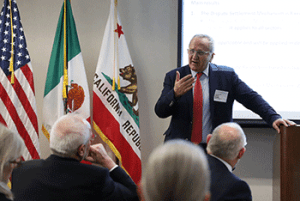
The U.S.-Mexico-Canada Agreement (USMCA) is a “wide, forward-looking agreement” that brought some of the best minds to the negotiating table, Dr. Jesús Seade Kuri, Mexico’s USMCA chief negotiator and undersecretary of foreign affairs for North America, told an intimate gathering of business and government leaders on Tuesday.
The January 28 luncheon held by the California Chamber of Commerce featured remarks from Seade, who explained some of the important aspects of the USMCA.
Yesterday, President Donald J. Trump signed the USMCA, saying, “The USMCA is the largest, most significant, modern, and balanced trade agreement in history. All of our countries will benefit greatly.”
The trade agreement still needs to be ratified by Canada, and it will not take effect until 90 days after the last country ratifies the deal.
The CalChamber supports the USMCA based on an assessment that the agreement serves the employment, trading and environmental interests of California, the United States, Mexico and Canada, and is beneficial to the business community and the California and national economies.
“Mexico and Canada are two of California’s strongest trading partners and trade with Mexico and Canada supports nearly 14 million U.S. jobs,” Allan Zaremberg, CalChamber president and CEO said. “The USMCA is a necessary modernization to NAFTA that recognizes the impacts of technology on the three countries’ economies.”
At Tuesday’s luncheon, Mexico’s Consul General in Sacramento, Ambassador Liliana Ferrer, welcomed Seade to Sacramento. Also in attendance were Assemblymember Jacqui Irwin (D-Thousand Oaks); George Tastard, director at the U.S. Commercial Service Sacramento; several members from Governor Gavin Newsom’s office; and representatives of various academic and state agencies.
Importance of Trade
Seade began his remarks by emphasizing the importance of bilateral trade between the U.S. and Mexico. Trade with Mexico, he said:
- Supports nearly 5 million U.S. jobs, or 1 out of 29 U.S. jobs;
- Totaled approximately $671.1 billion (USD) in 2018;
- Brought in $18.7 billion to the U.S. in investment from Mexican companies;
- Accounted for 15.9% of overall U.S. exports in 2018; and
- Supports 578,796 jobs in California alone.
Seade also pointed out that Mexico is not only California’s No. 1 export market—it’s also the first, second and third top destination for exports in 32 of 50 U.S. states.
NAFTA
The undersecretary acknowledged that the North American Free Trade Agreement (NAFTA), USMCA’s predecessor, needed to be revised because it had not properly addressed several problems. In particular, the dispute settlement mechanism of the agreement was greatly flawed, which allowed each country’s dispute panels to block resolutions. Later, an investor-state dispute settlement (ISDS) provision was added to NAFTA, further exacerbating the dispute settlement flaw, he explained.
Some of the criticisms of NAFTA, he continued, were that it solely benefited large corporations, and harmed small producers.
Age of Competition
Seade pointed out that facilitated transportation, technology and advanced forms of communication have made competition more acute.
Chileans can now readily buy from Russia, and someone from Texas can buy something directly from China. Companies can now easily fall to a producer in Norway or Malaysia, he said.
“Because of increasing competition, the world has become more of a village,” he said.
Moreover, once Brexit (British exit) is complete, he cautioned, Europe will become a fierce competitor.
Trump wanted to do away with NAFTA, but the world is now in an age of competition where it is essential for North America to do everything it can to compete and “be winners together,” he emphasized.
The U.S. is a magnet power, with an economy that “you cannot turn your back on,” Seade said.
USMCA
Overall, the USMCA is good for Mexico, but Seade expressed hope that some of the more “protectionist” measures, such as the Rules of Origin, can be relaxed in the coming decade.
Some of the improvements of USMCA that Seade outlined were:
- An effective Dispute Settlement Mechanism, which will be applied to all sectors, including labor. Each country will choose two panelists from the list of the other country. The mechanism will create equal conditions, Seade said.
- A Rapid Response Labor Mechanism that maintains each country’s sovereignty, but establishes penalties for companies found to be at fault by the established panel.
- A Digital Trade Chapter that protects intellectual data and helps develop the IT industry in Mexico.
- Each country will set its own rules on generic drug manufacturing.
Seade acknowledged that the USMCA negotiations in the U.S. were “very difficult” due to the fact that they were “triangular negotiations” with the White House, Senate Republicans and House Democrats.
The undersecretary commended the USMCA as a “wide, forward-looking agreement” that in the end has “massive bipartisan support,” both in the U.S. and Mexico.
“I think it’s very good for the three economies.”
Staff Contact: Susanne T. Stirling


